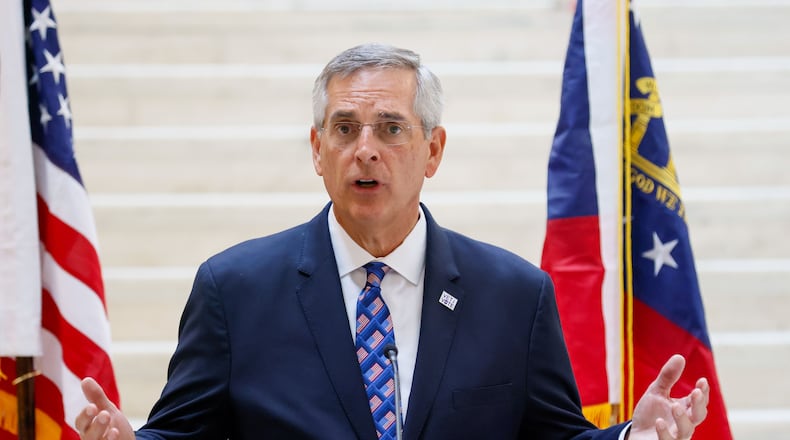Secretary of State Brad Raffensperger finalized Georgia’s presidential ballot Thursday, overruling the recommendations of an administrative law judge by including Socialist candidate Claudia De la Cruz and independent Cornell West alongside Democrat Kamala Harris, Republican Donald Trump, Libertarian Chase Oliver and the Green Party’s Jill Stein.
Georgia’s finalized presidential slate of a half-dozen candidates creates more competition in what is expected to be a close race between Harris and Trump.
Chief State Administrative Law Judge Michael Malihi submitted his recommendation Monday, siding with Democratic-backed challenges to narrow the field by keeping De la Cruz and West off the ballot. Malihi also recommended against placing independent candidate Robert F. Kennedy Jr. on the ballot, but Kennedy voluntarily removed his name after suspending his campaign last week.
Malihi also ruled that Stein should not appear on the ballot as the nominee for the Georgia Green Party, but Stein had two paths to the Georgia ballot. One was by being the nominee of the Georgia Green Party. Another was by being the nominee of the national Green Party, which is not affiliated with the Georgia Green Party.
Raffensperger said Stein can appear on the ballot as the national Green Party’s nominee. That’s because a new state law allows candidates who appear on at least 20 other state ballots to automatically qualify for Georgia’s ballot.
The Democratic-supported challenges filed last month were part of a national effort to bar long-shot candidates from draining votes away from Harris. Georgia Republicans filed briefs supporting the minor candidates.
Georgia Democrats criticized the secretary of state’s decision.
“A judge affirmed that none of these candidates were qualified to be on the Georgia ballot. The secretary of state ignored the judge’s ruling that found each party failed to play by the rules. State election law is clear, and we are exploring our options,” Democratic Party of Georgia Executive Director Kevin Olasanoye wrote in a statement.
Georgia GOP Chair Josh McKoon said Raffensperger is simply upholding state law.
“Georgia Republicans, unlike Georgia Democrats, are unafraid of Georgians having choices when they vote for president this fall,” McKoon said.
Joe Biden beat Trump by fewer than 12,000 votes in 2020, and 2024′s race with a half-dozen presidential candidates could tip the balance in Trump’s favor over Harris, said Donald Bell, an assistant political science professor at Savannah State University.
“Historically, in elections, Democrats and Republicans are always going to act in the best interest of their party,” Bell said. “And one of the ways to do that is to be active in the legal system, and both parties have been guilty of ‘taking it to the court’ to limit ballot access for third parties.”
Raffensperger’s decision will mean supporters who would likely support Harris may instead vote for the Green Party or Socialist candidates, Bell said.
Meanwhile, Trump will contend with Oliver to win over conservative voters.
“The Libertarian is much more aligned with people who are dissatisfied with Trump as a candidate, but I think they are very unlikely to take votes away from the Harris campaign,” Bell said.
This year is the first time since 2000 that Georgia voters will choose from more than a Democrat, Republican and Libertarian presidential candidate. Georgia voters can still write in the name of a candidate not on the November ballot.
“It is a true toss-up — and a toss-up of large magnitude because of Georgia’s 16 electoral votes,” Bell said.
While the three independent and third-party candidates are unlikely to win the state, both Stein’s campaign and De la Cruz’s campaign told The Atlanta Journal-Constitution that ballot access puts them one step closer.
About the Author
Keep Reading
The Latest
Featured





